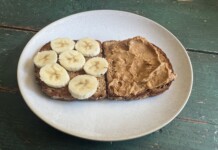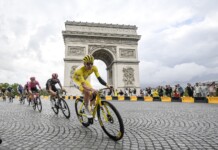By Nancy Clark MS RD CSSD — Many athletes train in the early morning. Rowers commonly meet at 5:30 a.m. Hockey players might get rink-time at 5:00 a.m.. Athletes who need to be at work at 7:00 often train at 4:30 a.m. Many of these athletes report eating nothing before their training session. My stomach isn’t awake. … It’s too early to even think about food. … I get reflux if I eat. Others report they have better workouts when they eat something simple. The question arises: What’s the best way to fuel for early morning workouts?
Before answering that question, let’s first address the physiological goals for fueling before morning workouts.
- To change the stress-hormone profile. Cortisol (a stress hormone) is high in the early morning. This puts your body in muscle-breakdown mode. Eating carbs + protein can switch to muscle-building mode.
- To provide energy and prevent low blood glucose with the consequences of feeling light-headed, dizzy, and needlessly fatigued.
- To be adequately hydrated. Dehydration slows you down.
If you are making the effort to get up early to train, you might as well get the most out of your workout! In a fueling study, athletes had dinner the night before and then a 60-minute exercise test the next morning. They performed 6% better in the 10-minute sprint to the finish when they had some fuel (carb) compared to having had nothing; 6% better when they had adequate water (compared to minimal water), and 12% betterwhen they had both fuel + water (a sport drink). (1) Twelve percent better means running an 8-minute mile in about 7 minutes. Powerful, eh?
Your body can digest pre-exercise food and use it to energize your exercise as long as you are exercising at a pace that you can maintain for more than 30 minutes. (If you do stop-and-start exercise, you can still digest the food, but at a slower rate.) In another fueling study, athletes ate dinner and than nothing for the next 12 hours. Those who ate 180 calories (sugar) just five minutes before an hour-long exercise test performed 10% better in the last 15 minute sprint compared to when they ate nothing (2). Grab that granola bar or swig of juice!
If you are tempted to skip pre-exercise food so you can lose weight by burning more fat, think again. Yes, pre-exercise food will contribute to burning less fat at the moment, but that is irrelevant. The issue is not whether you have burned fat during exercise but if you have created a calorie deficit by the end of the day. Eating excess calories after a fat-burning workout gets you nowhere.
All of this means consuming some food and fluid on your way to the gym, spin class, or boot camp will enhance your workout—assuming you have trained your gut to tolerate the food and fluids. If you are worried about intestinal distress, start small (a few crackers) and work up to a handful of crackers, and then add, let’s say, a latte. For workouts longer than 60 minutes, the recommended intake is about 200 to 400 calories within the hour before you train. That recommendation obviously varies according to body size, exercise intensity and duration, and personal tolerance to food.
If you have been exercising on empty, you will likely discover you can exercise harder, feel better, and get more enjoyment from your workouts. Research subjects who ate 400 pre-exercise calories were able to exercise for 136 minutes until they were exhausted, as compared to only 109 minutes with no breakfast (3). Big difference! After learning this, one of my clients reported he was done with skipping pre-exercise fuel in the name of intermittent fasting. “Not eating is slowing me down and taking the fun out of my workout.”
Early morning options
Here are some options for fueling your early morning workouts so you are adequately hydrated and fueled.
- Eat a quick and easy snack with about 200 to 400 calories (depending on your body size and workout intensity). Some popular options include: English muffin, toast, bagel or banana (with peanut butter); oatmeal, a smoothie, Fig Newtons, or granola bar. Coffee is OK; it’s a functional fluid that boosts performance and yes, helps with hydration.
- Wake up 4 hours before important training sessions/events, eat a simple breakfast (bread + peanut butter), then go back to bed. This is a common practice among elite athletes. As one marathoner explained, “I don’t want to have food in my stomach when I’m racing. If a race starts at 8:00 a.m., I’ll get up at 4:00, eat a bagel with peanut butter and a banana, and then go back to bed. At 6:00, I’ll get up, have some coffee (to help me take a dump and wake me up), and then get to the race start. Because I never really sleep well the night before an event, getting up at 4:00 isn’t terribly disruptive.” In comparison, a rower reported she used to wake up two hours before practice to eat. She became too sleep-deprived and decided she needed sleep more than food. She started eating a bigger bedtime snack.
- Eat your breakfast the night before via a bedtime snack, such as a bowl of cereal, or yogurt with granola. If you have dinner at 6:00, you’ll be ready for a bedtime snack by 9:00. Choose quality calories; this is your breakfast that you are eating the night before. Limit the cookies and ice cream!
- Fuel during your workout. If your stomach isn’t awake when you first get up, it may be receptive to fuel when you are 30 minutes into your bike ride, run, or row. Be sure you have some fuel with you: sport drink, dried pineapple, gels, chomps, gummy bears—whatever is easy to carry and simple to digest. You want to target about 30 to 60 grams carb (120 to 240 calories) if the workout lasts 1 to 2.5 hours, and 60 to 90 g carb (240 to 360 cal) if the workout is longer than that..
What about “training low”?
If you are highly competitive and has mastered the sports nutrition basics (eat a diet with 90% quality foods; fuel evenly during the day; have no disordered eating behaviors), you might try training low (with depleted muscle glycogen and/or low blood glucose) once a week or so. To do this, eat primarily protein for dinner after a late-afternoon workout. The next morning, train without having eaten carbs. Exercising depleted like this is not fun, but it stimulates cellular changes that can be performance enhancing if you need to get to the next level (4). Novice and recreational athletes, however, first need to work on the basic ways to improve performance—by surrounding their workouts with food, and fueling wisely the rest of the day.
References
- Below, P. et al. Fluid and carbohydrate ingestion independently improve performance during 1 hour of intense exercise. Med Sci Sports Exerc 27:200-210, 1995.
- Neufer P. et al. Improvements in exercise performance: effects of carbohydrate feedings and diet. J Appl Physiol 62(3):983, 1987
- Schabort, E. et al. The effect of a preexercise meal on time to fatigue during prolonged cycling exercise. Med Sci Sports Exerc 31(3):464-471, 1999.
- Hawley J and Burke L. Carbohydrate availability and training adaptation: effects on cell metabolism. Exerc Sport Sci Rev. 38(4):152-60, 2010.








![Cycling and Achilles Tendon Pain The muscles of the anterior compartment of the lower leg are generally responsible for dorsiflexion, and the muscles of the posterior compartment of the lower leg are generally responsible for plantar flexion. The lateral and medial muscles in both compartments invert, evert, and rotate the foot. By OpenStax College (https://cnx.org/contents/FPtK1zmh@8.108:y9_gDy74@5) [CC BY 3.0 (https://creativecommons.org/licenses/by/3.0)], via Wikimedia Commons Download for free at http://cnx.org/contents/14fb4ad7-39a1-4eee-ab6e-3ef2482e3e22@8.108](https://www.cyclingwest.com/cms/wp-content/uploads/2014/05/1123_Muscles_of_the_Leg_that_Move_the_Foot_and_Toes_b-100x70.png)

